Ans eukaryotic - Study guides, Class notes & Summaries
Looking for the best study guides, study notes and summaries about Ans eukaryotic? On this page you'll find 1211 study documents about Ans eukaryotic.
Page 3 out of 1.211 results
Sort by
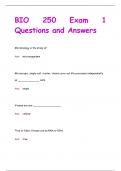
-
BIO 250 Exam 1 Questions and Answers
- Exam (elaborations) • 113 pages • 2024
- Available in package deal
-
- $15.49
- + learn more
Microbiology is the study of: Ans: microorganisms Microscopic, single-cell, cluster, chains carry out life processes independently as ______________ cells. Ans: single Viruses are non-__________________ Ans: cellular True or false: Viruses can be RNA or DNA. Ans: true What are the two themes of microbiology? Ans: basic and applied Applied microbiology is practical problems in _____________________, _______________, and __________________. Ans: agriculture, health, industry Basic ...
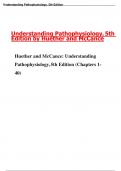
-
Understanding Pathophysiology,5th Edition (Chapters 1- 40):Understanding Pathophysiology,5th Edition by Huether and McCance : 100% Verified Questions & Answers: Latest Updated
- Exam (elaborations) • 653 pages • 2024
- Available in package deal
-
- $10.00
- + learn more
. A student is observing a cell under the microscope. It is observed to have supercoiled DNA with histones. Which of the following would also be observed by the student? ANS: B The cell described is a eukaryotic cell, so it has histones and a supercoiled DNA within its nucleus; thus, the nucleus should be observed. A single circular chromosome is characteristic of prokaryotic cells, which do not have histones. Free-floating nuclear material describes a prokaryotic cell, which would not h...
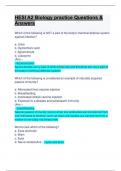
-
HESI A2 Biology practice Questions & Answers: Guaranteed A+ Guide: Latest Updated
- Exam (elaborations) • 30 pages • 2023
- Available in package deal
-
- $8.50
- + learn more
Which of the following is NOT a part of the body's chemical defense system against infection? a. Urine b. Hydrochloric acid c. Agranulocyte d. Lysozyme (Ans – - Agranulocytes Agranulocytes are a type of white blood cell and therefore are not a part of the body's chemical defense system. Which of the following is considered an example of naturally acquired passive immunity? a. Attenuated (live) vaccine injection b. Breastfeeding c. Inactivated (killed) vaccine injection d....
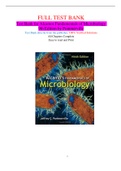
-
Test Bank for Alcamos Fundamentals of Microbiology 9th Edition by Pommerville (All Chapters Complete, All Answers Verified 100%)
- Exam (elaborations) • 713 pages • 2023
-
Available in package deal
-
- $32.49
- 1x sold
- + learn more
Test Bank for Alcamos Fundamentals of Microbiology 9th Edition by Pommerville Test Bank for Alcamos Fundamentals of Microbiology 9th Edition by Pommerville Chap01, Chapter 1 Multiple Choice 1. Who was one of the early natural philosophers who coined the name “cella” for the empty cork spaces that became the word we use today, “cells”? A. Robert Hooke B. Zacharias Janssen C. Francesco Stalluti D. Giovanni Faber Ans: A 2. Leeuwenhoek made lenses that allowed him to magnify o...
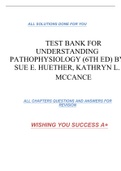
-
TEST BANK FOR UNDERSTANDING PATHOPHYSIOLOGY (6TH ED) BY SUE E. HUETHER, KATHRYN L. MCCANCE
- Exam (elaborations) • 369 pages • 2023
-
- $5.19
- 4x sold
- + learn more
TEST BANK FOR UNDERSTANDING PATHOPHYSIOLOGY (6TH ED) BY SUE E. HUETHER, KATHRYN L. MCCANCE TEST BANK FOR UNDERSTANDING PATHOPHYSIOLOGY (6TH ED) BY SUE E. HUETHER, KATHRYN L. MCCANCE TEST BANK FOR UNDERSTANDING PATHOPHYSIOLOGY (6TH ED) BY SUE E. HUETHER, KATHRYN L. MCCANCE PART ONE: BASIC CONCEPTS OF PATHOPHYSIOLOGY Unit 1: The Cell 1. Cellular Biology 2. Genes and Genetic Diseases 3. Epigenetics and Disease (NEW) 4. Altered Cellular and Tissue Biology 5. Fluids and Electrolytes,...
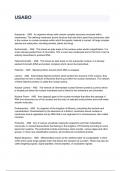
-
USABO EXAM QUESTIONS AND ANSWERS
- Exam (elaborations) • 70 pages • 2024
- Available in package deal
-
- $14.99
- + learn more
USABO EXAM QUESTIONS AND ANSWERS Eukaryote - ANS An organism whose cells contain complex structures enclosed within membranes. The defining membrane bound structure that sets them apart from prokaryotic cells is the nucleus or nuclear envelope within which the genetic material is carried. All large complex species are eukaryotes, including animals, plants and fungi. Euchromatin - ANS This shows as pale areas in the nucleus under electro magnification. It is a less densely packed for...

-
BIOL 172L EXAM 1 UH MANOA Questions with Complete Correct Answers | Grade A+
- Exam (elaborations) • 21 pages • 2024
-
- $12.99
- + learn more
Endosymbiosis Ans: Organelles originated when a single-celled organism engulfed another single-celled organism • Usually obligate: the survival of one depends on the other the process in which unicellular organisms engulf other cells, which will then function as organelles within the host cell. Studies of DNA sequencing suggest that green and red algae developed when heterotrophic eukaryotes engulfed cyanobacteria. Algae Ans: -Eukaryotic • Aquatic • Photo-autotrophs • Unice...
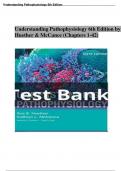
-
Understanding Pathophysiology 6th Edition:Understanding Pathophysiology 6th Edition by Huether & McCance (Chapters 1-42): Updated A+ Guide Solution
- Exam (elaborations) • 368 pages • 2024
- Available in package deal
-
- $10.01
- + learn more
A student is observing a cell under the microscope. It is observed to have supercoiled DNA with histones. Which of the following would also be observed by the student? a. A single circular chromosome b. A nucleus c. Free-floating nuclear material d. No organelles ANS: B The cell described is a eukaryotic cell, so it has histones and a supercoiled DNA within its nucleus; thus, the nucleus should be observed. A single circular chromosome called a prokaryote contains free-floating nuclear...

-
Biochem Final Exam Questions & Correct Answers | Grade A
- Exam (elaborations) • 20 pages • 2024
-
- $11.49
- + learn more
T/F: According to the module, a compound with a molecular mass of 1,000 g/mol is considered a macromolecule. Ans- false macromolecule >5,000 g/mol T/F: Biomolecules can have two or more different functional groups. Ans- true T/F: The following group is an amine. C2H5NH2 Ans- true T/F: In a eukaryotic cell, the organelles called peroxisomes serve the purpose of digesting macromolecules. Ans- false peroxisomes degrade dangerous/hazardous molecules, lysosomes degrade macromolecul...
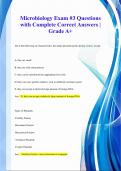
-
Microbiology Exam #3 Questions with Complete Correct Answers | Grade A+
- Exam (elaborations) • 67 pages • 2024
- Available in package deal
-
- $16.09
- + learn more
All of the following are characteristics that make plasmids good cloning vectors, except A. they are small B. they are well characterized C. they can be transferred into appropriate host cells D. they can carry genetic markers, such as antibiotic resistance genes E. they can accept a relatively large amount of foreign DNA Ans: E. they can accept a relatively large amount of foreign DNA Types of Plasmids: -Fertility Factors -Resistance Factors -Bacteriocin Factors -Virulence Plasmids ...

$6.50 for your textbook summary multiplied by 100 fellow students... Do the math: that's a lot of money! Don't be a thief of your own wallet and start uploading yours now. Discover all about earning on Stuvia


